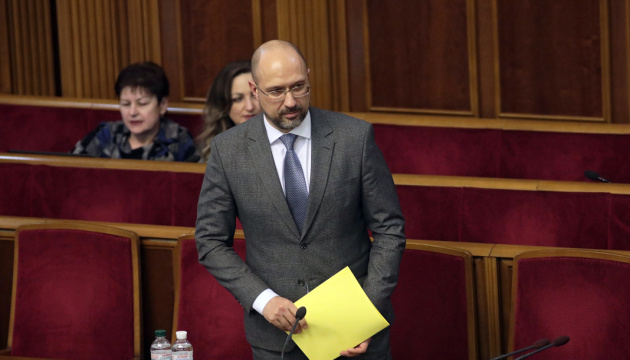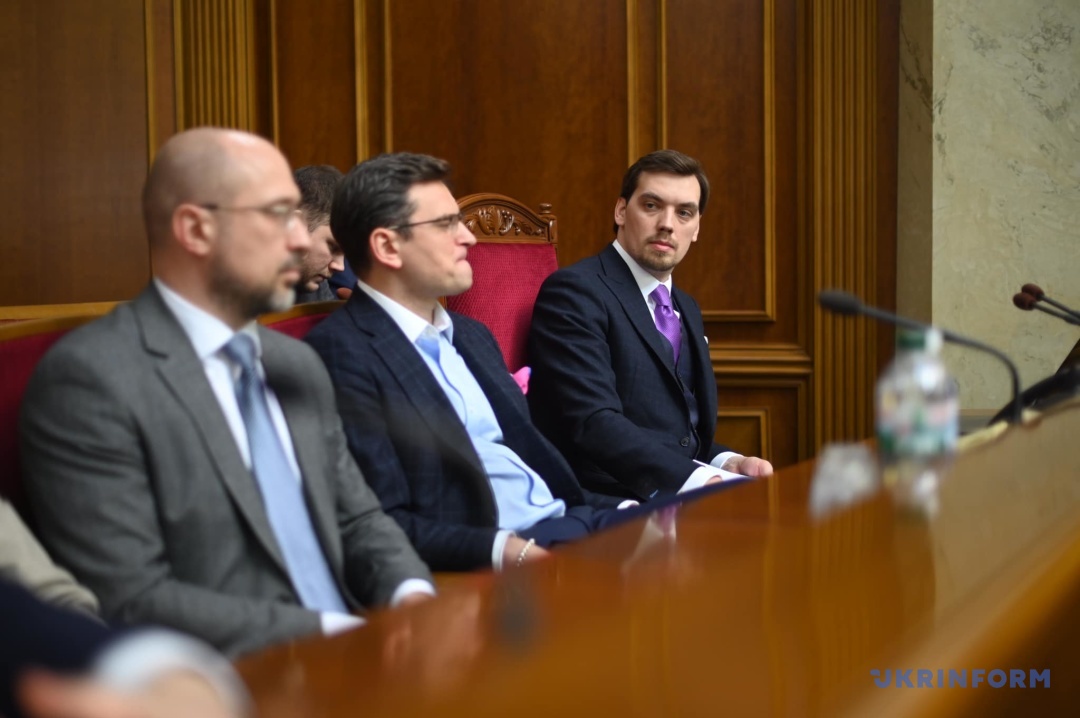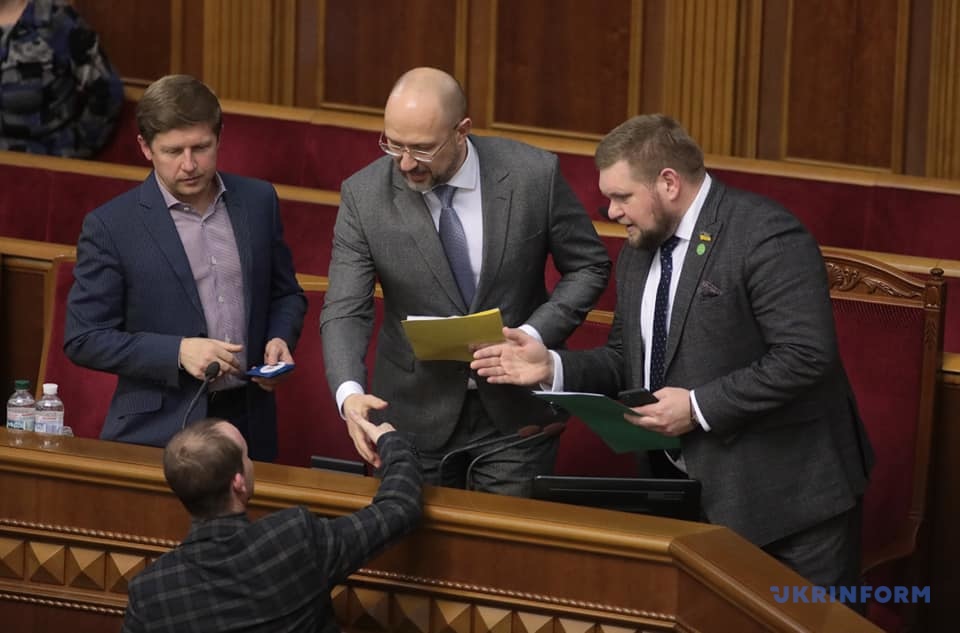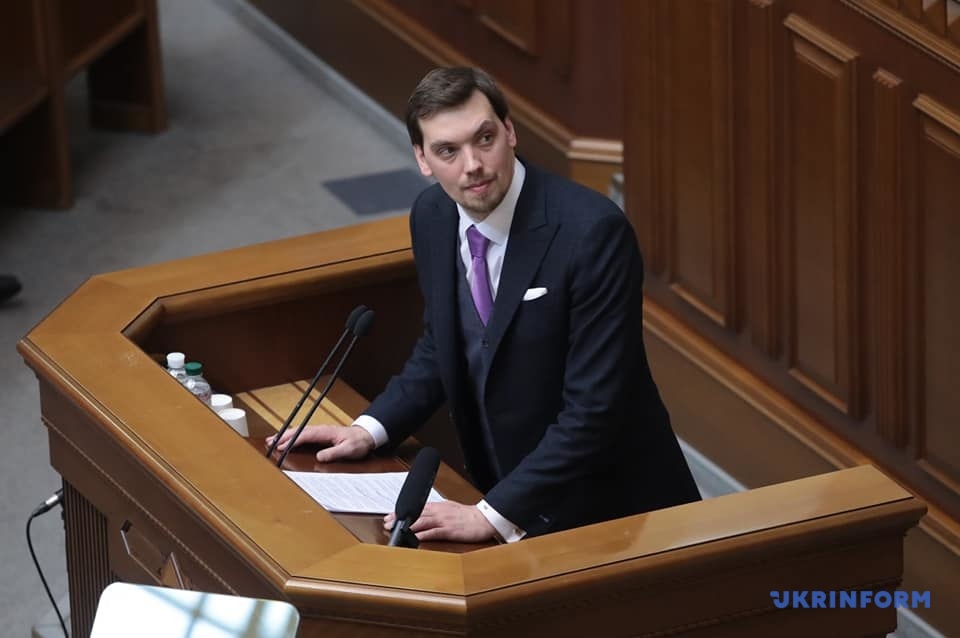
Ukraine’s new Cabinet of Ministers
The Ukrainian parliament dismissed Prime Minister Oleksiy Honcharuk at a snap meeting and appointed Denys Shmygal as new head of the government.
According to the Constitution, the government of Ukraine (the Cabinet of Ministers) is the highest authority in the system of public executive authorities; it consists of the prime minister, vice prime ministers and ministers.
The prime minister of Ukraine is appointed by the parliament on the submission of the president of Ukraine.
The defense minister and the foreign minister are also appointed on the submission of the president of Ukraine; other members of the government are appointed by the Verkhovna Rada on the submission of the prime minister.

In a speech in the parliament on March 4, President of Ukraine Volodymyr Zelensky stated that the previous government had "achievements", including inflation slowdown, reduction of the discount rate of the National Bank of Ukraine, the fight against shadow markets, particularly, gambling and illegal gas filling stations, the launch of privatization of state-owned enterprises, loans to small and medium-sized businesses, reducing the role of the state in the economy, but that’s not enough for “Ukrainians today”. He criticized the previous government, led by Oleksiy Honcharuk, for inefficient fight against smuggling, the state budget shortage and decline in the industry.
Former Prime Minister Oleksiy Honcharuk thanked his team for the work, stressing that there was no corruption in his government, but there was a systematic fight against it, which laid the foundation for the further development of the country.

The new prime minister of Ukraine, 45-year-old Denys Shmygal prior to his current appointment served as deputy prime minister - minister for development of communities and territories. He headed the Ivano-Frankivsk Regional State Administration. He has a degree in economics. A total of 291 MPs voted for his appointment.
The resignation of the head of the Cabinet of Ministers also means the resignation of the whole government. Оn the same day, March 4, the Verkhovna Rada with 277 votes approved a new composition of the Cabinet of Ministers. In particular, the new government was supported by the presidential faction Servant of the People (228 votes), two people’s deputy groups For Future (18 votes) and Dovira (17 votes), and 14 independent MPs.

Other parliamentary factions did not back the new government. In particular, the Opposition Platform – For Life faction voted against with 33 votes, as well as ex-President Petro Poroshenko's European Solidarity faction – 23 votes, the whole Batkivshchyna faction abstained (20 votes) and 20 MPs from the Holos faction left the session hall before the voting.
Vice Prime Minister - Minister for Digital Transformation of Ukraine Mykhailo Fedorov retained the position, as well as three ministers – Justice Minister Denys Maliuska, Infrastructure Minister Vladyslav Kryklii and Interior Minister Arsen Avakov. Former Foreign Minister Vadym Prystaiko and Deputy Prime Minister for European and Euro-Atlantic Integration Dmytro Kuleba replaced each other - the first one became a vice prime minister in the new government and the second became a minister, respectively.
The Verkhovna Rada appointed Lieutenant General Andriy Taran as Ukraine's new defense minister on a motion from the president.
Ukraine's representative in the Minsk Contact Group, Oleksiy Reznikov, has become vice prime minister – minister for reintegration of the occupied territories, which is new in the government. The Ministry of Culture, Youth and Sports has been separated - Vadym Huttsait, who previously headed the same department at the Kyiv City Administration, has been appointed as minister of youth and sports. Instead of the Ministry for Veterans Affairs, Temporarily Occupied Territories and Internally Displaced Person, now there will be the Ministry for Veterans Affairs led by Serhiy Bessarab, who stepped down as deputy chief of the General Staff.
The new Cabinet of Ministers also includes Health Minister Illia Yemets, a doctor who already occupied this post in 2010-2011; Social Policy Minister Maryna Lazebna, a former head of the State Social Service of Ukraine; Minister of the Cabinet of Ministers Oleh Nemchinov, a former Secretary of State in the Ministry of Youth and Sport; Finance Minister Ihor Umansky, a former advisor to the president of Ukraine; Minister for Communities and Territories Development Oleksiy Chernyshov, a former head of the Kyiv Regional State Administration.
Four posts of minister still remain vacant. In particular, these are the positions of heads of the Education and Science Ministry, the Ministry of Energy and Environmental Protection, the Ministry for Development of Economy, Trade and Agriculture and the Culture Ministry.
After government reshuffle, President of Ukraine Volodymyr Zelensky promised to review staff decisions on other state positions - the executive branch includes several dozen specialized services, agencies, inspectorates and commissions, as well as supervisory boards.
Prime Minister Denys Shmygal, among his first plans, promised to hold a meeting with representatives of the government's financial block, including senior managers of the State Customs Service, to develop amendments to the Constitution on the decentralization of power, to continue the healthcare reform, to restore coal mining regions with the involvement of the World Bank.
The new government also plans to develop a range of economic programs for medium and large businesses, as well as attract external and internal investment.
With regard to land reform, according to the new prime minister, the land market should be open first to Ukrainians, and the possibility of selling to foreigners should be decided through an all-Ukrainian referendum.
iy
